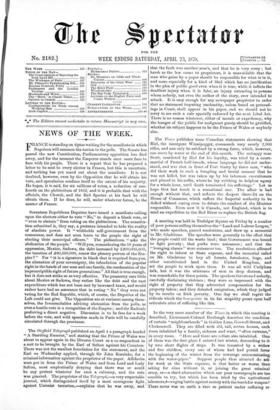The Sheffield Telegraph published on April 4 a paragraph headed
"A Startling Rumour," and stating that the Prince of Wales was about to appear again in the Divorce Court as a co-respondent in a suit to be brought by the Earl of Sefton against his Countess. There was not the smallest foundation for the statement, and the Earl on Wednesday applied, through Sir John Kerslake, for a criminal information against the proprietor of the paper. Affidavits were put in from the Prince of Wales and from Lord and Lady Sefton, most emphatically denying that there was or could be any pretext whatever for such a calumny, and the rule was granted. The proprietor of the Telegraph,—a very respectable journal, which distinguished itself by a most courageous fight' against Unionist terrorism,—explains that he was away, and
that the fault was another man's, and that he is very sorry ; but harsh as the law seems to proprietors, it is unavoidable that the man who gains by a paper should be responsible for what is in it, and more especially for a kind of libel which has no justification in the plea of public good even when it is true, while it inflicts the deadliest injury when it is false, an injury extending to persons whom nobody, not even the author of the story, ever intended to attack. It is easy enough for any newspaper proprietor to order that no statement imputing unchastity, unless based on proceed- ings in Court, shall appear in his paper, and we should not be sorry to see such a rule specially enforced by the next Libel Act. There is no reason whatever, either of morals or expediency, why the hunger of the public for malignant gossip should be gratified, whether its subject happens to be the Prince of Wales or anybody else.






























